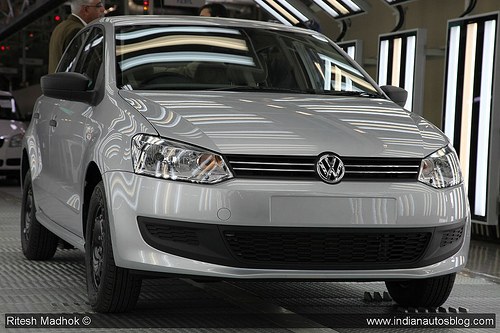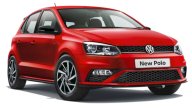Images and Information - VW Polo production commences
 The first Indian VW Polo rolled out of Pune plant and we have all the pics and info.
The first Indian VW Polo rolled out of Pune plant and we have all the pics and info.
VW India started production of the much anticipated Polo hatchback at their Chakan plant today and gracing the occasion were the Chief Minister of Maharashtra Mr. Ashok Chavan, Volkswagen Group Board Member Prof. Heizmann and VW Group India Head Joerg Muller.
This was an very important occasion as the first locally manufactured Polo rolled out from the Pune plant. It is VW's first opportunity to show how serious they are about the Indian market.
Speaking during the press conference after the rollout of the first car, VW's heads made a few important statements -
The Chakan plant is the most modern VW facility anywhere in the world.
The Polo would be available only at VW dealers which are 25 in number now. The number will grow to 40 over the next few months.
The Chakan plant has an capacity of 110,000 vehicles.
Manufactured at the plant would be the Fabia , Polo and an all new Saloon (which surprisingly would not be the Polo Saloon).
The tie-up with Suzuki is a long-term one and VW hopes to get penetrate the ASEAN countries where Suzuki has a strong foothold. Suzuki's end of the partnership will see them utilizing VW to get a good opportunity to explore countries where VW is prominent.
Suzuki hopes to make use of hybrid technology developed by VW through the tie-up.
Suzuki is very strong in the field of making small cars and small engines which would be helpful for VW.
An all new training centre is to be setup at the Chakan Plant for in-house training of employees.
Localization on the Polo is 50% on day one and would go up to 80% in the next few months.
A car below the Polo segment would be also manufactured later. Clarity on whether they are speaking about the Up! or the small car which will result from the tie-up is expected in future announcements.
VW is studying the Indian Market for Commercial vehicles where competition now is less.
Exports of Polo is very much possible but not to EU countries.
Official launch for the Polo in Jan 2010 and a date would be provided.We expect the Polo to be launched during the Auto Expo.
VW Polo production Chakan, India Image Slideshow
If you're not able to view the slideshow above, visit the VW Polo Chakan, India rollout Image Gallery directly
Press Release
| Volkswagen India starts production of its first made-in-India car Polo
Hon’ble Maharashtra CM, Shri. Chavan and Volkswagen Group Board Member, Prof. Dr. Heizmann rollout the first Polo at Volkswagen’s Pune Plant / Heizmann: “Start of Production marks a Milestone in our Journey into a successful Future” / Volkswagen Group India Head Joerg Mueller: “Families of our employees integral part of VW” / Volkswagen India celebrates rollout of Polo with first Family Day for Employees Pune – December 12, 2009: The Honorable Chief Minister of Maharashtra Shri Ashok Chavan and Prof. Dr. Jochem Heizmann, Member of the Board of Management of Volkswagen AG, with responsibility of ‘Group Production’, formally rolled out Volkswagen India’s first locally manufactured Polo from its plant in Chakan, Pune. Other honourable guests who graced the occasion with their presence were Shri. Rajendra J. Jarda, Minister of Industries and Employment for state of Maharashtra, Shri. Sachin Ahir, State Minister of Industries and Housing Development as well as His Excellency Mr. Thomas Matussek, German Ambassador to India. Speaking on the occasion, Prof. Dr. Jochem Heizmann said, “Today’s start of production of our Polo is more than just the rollout of a car. It marks a milestone in our journey together into a successful future for the Volkswagen Group in India.” Since India is a strategic market for the Volkswagen Group and holds enormous potential for it, Prof. Heizmann added, “We aim to achieve a market share of eight to ten percent in the next four to six years with the three Volkswagen Group brands, Audi, Skoda, and Volkswagen by ambitious plans for India. We offer outstanding products, which will soon be joined in the market by another one – the Polo. These products – and in particular our Polo – will help us to increase our market share of this growing market significantly.” “The Polo is eagerly awaited here in India”, he added. “And quite rightly so, because our Polo stands for first-class German engineering and superior state-of-the-art technology. It is a young, fresh and cosmopolitan car. We have aligned the current model systematically and uncompromisingly with our customers’ expectations.” In Europe, the Polo has become the benchmark for the small car segment and has now created its own class – the Polo class. Volkswagen has received more than 130,000 orders since the new model was launched in May this year. The Polo has also been voted The Car of the Year – one of the oldest and most prestigious honors. According to Prof. Heizmann, “Customers need to be convinced of the benefits of owning a Volkswagen Group car and must want to buy it. Ultimately, the customer is a brand’s best ambassador. We are dead certain that we will bring forward the European success story of our Polo to India.” Expressing his gratitude to the employees who shared the historical moment of the rollout together with there families, Prof. Dr. Jochem Heizmann stated: “Our employees worldwide ensure the high quality of our products with their skills and motivation. I am especially impressed with the abilities and the high level of commitment shown by the Indian staff we have recruited for our company. And we will continue to develop these skills of each and every employee by extensive ongoing training. Each individual will be put in the position to be able to build the best possible car.” Volkswagen India commemorated the rollout of the Polo with the first Family Day for the employees. According to Mr. Joerg Mueller, Volkswagen Group Chief Representative India and President & Managing Director Volkswagen India Private Limited, “This is the first time that Volkswagen has celebrated the rollout of a new model together with the families of its employees. The families of our employees are an integral part of Volkswagen’s extended family.” The timeframe leading up to the official start of production of the Volkswagen Polo is unusual as it is only two years since the first construction work began at the Volkswagen Pune site. “Since then, we have made great efforts to implement optimal processes and achieve a level of quality that is the standard in every Volkswagen plant throughout the world. This was a major challenge”, Mr. Mueller added. “Volkswagen is about more than just ‘cars’. It embodies a unique style that gives its products – our cars – a unique spirit.” The Pune plant is a key element in Volkswagen’s India strategy. The scale of investment, commissioning local suppliers and employing people primarily from the region itself demonstrate Volkswagen’s commitment to India. Volkswagen is making an important contribution to the economic development in the region and in the Indian economy in general. The factory, which is one of the most state-of-the-art in the Volkswagen Group worldwide, has an annual capacity of around 110,000 cars. With a total volume of around €580 million, it is the largest investment to date by a German company in India. It is also the only plant operated by a German automaker in India that covers the entire production process – from the press shop, through body and paint shops, to assembly. The processes in the new plant have been flexibly designed. Based on the current plans, this means Volkswagen will produce three different models – the Škoda Fabia since May 2009, the Polo Hatchback from now on and a saloon that will be launched in the second half of 2010. The Polo will reflect Volkswagen India’s efforts to reach the highest possible degree of localization. Almost 50 percent localization has already been achieved with a target of around 80 percent within the next two to three years. This will enable Volkswagen India to offer cars at competitive prices and with a high level of quality. |




